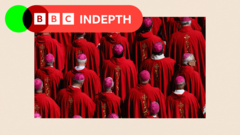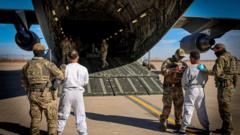As cardinals gather, contrasting views emerge on how to move forward for the Catholic Church.
**Vatican Conclave: The Complex Divide Ahead of Selecting a New Pope**

**Vatican Conclave: The Complex Divide Ahead of Selecting a New Pope**
Exploring the intricate undercurrents shaping the upcoming papal conclave amid Pope Francis's legacy.
In just a few days, the Vatican's Santa Marta guesthouse will serve as the temporary residence for 133 cardinals as they convene for the conclave to elect the next pope after the passing of Pope Francis. A room marked with a red ribbon will remain closed until the new pope is appointed, serving as a poignant reminder of the legacy left behind. Pope Francis's influence looms large over this conclave; he was at the helm for 12 years and appointed about 80% of the cardinals now tasked with choosing his successor.
Discussions amongst the cardinals focus largely on how to build upon his work, though mixed sentiments persist. While many believe in continutiy with Francis's progressive approach, a contingent of critics challenges his methods and vision, raising the question of whether their dissent might influence the outcome.
This conclave stands out for its unprecedented diversity, marking the inclusion of cardinals from places such as Cape Verde, Haiti, and South Sudan, among others, reflecting a Catholic Church that, like its global congregation, is increasingly heterogeneous. The plurality in perspectives is on clear display with the divergent priorities of regions; for instance, while Europe seeks to address declining participation in church activities, African and Asian cardinals are more focused on poverty and social issues.
As the next pontiff will inherit an array of titles, including "Vicar of Jesus Christ" and "Sovereign of the State of Vatican City," the role encompasses both spiritual leadership and political responsibilities, prompting discussions surrounding the pope as a statesman who can navigate both ecclesiastical and global challenges.
Cardinal Nichols points out that the role has become particularly relevant to people outside the Catholic community, and many await with anticipation the type of leadership the next pope will offer. The priorities within the Church include tackling sexual abuse and financial corruption, as well as enriching the involvement of laity in decision-making processes. Pope Francis made strides toward these goals, but clarity on their implementation remains desired.
In the lead-up to the conclave, cardinals aged over 80—who are ineligible to vote—have voiced their concerns about Francis's approach to church governance and management, suggesting that he may have concentrated too much power in his own hands. However, a strong undercurrent of support for the themes emphasized by Francis—such as addressing social justice and environmental issues—was evident during his funeral, where calls for compassion resonated deeply.
Throughout these discussions, the notion of unity has emerged, especially after a time marked by divisive perspectives on the Church's direction. When the cardinals enter the Sistine Chapel for voting, the call will be for spiritual guidance in choosing a leader who can effectively continue to bridge the divides that remain around Pope Francis's legacy. Ultimately, the conclave poses a pivotal moment that may well redefine the future trajectory of the Catholic Church in a rapidly evolving world.
Discussions amongst the cardinals focus largely on how to build upon his work, though mixed sentiments persist. While many believe in continutiy with Francis's progressive approach, a contingent of critics challenges his methods and vision, raising the question of whether their dissent might influence the outcome.
This conclave stands out for its unprecedented diversity, marking the inclusion of cardinals from places such as Cape Verde, Haiti, and South Sudan, among others, reflecting a Catholic Church that, like its global congregation, is increasingly heterogeneous. The plurality in perspectives is on clear display with the divergent priorities of regions; for instance, while Europe seeks to address declining participation in church activities, African and Asian cardinals are more focused on poverty and social issues.
As the next pontiff will inherit an array of titles, including "Vicar of Jesus Christ" and "Sovereign of the State of Vatican City," the role encompasses both spiritual leadership and political responsibilities, prompting discussions surrounding the pope as a statesman who can navigate both ecclesiastical and global challenges.
Cardinal Nichols points out that the role has become particularly relevant to people outside the Catholic community, and many await with anticipation the type of leadership the next pope will offer. The priorities within the Church include tackling sexual abuse and financial corruption, as well as enriching the involvement of laity in decision-making processes. Pope Francis made strides toward these goals, but clarity on their implementation remains desired.
In the lead-up to the conclave, cardinals aged over 80—who are ineligible to vote—have voiced their concerns about Francis's approach to church governance and management, suggesting that he may have concentrated too much power in his own hands. However, a strong undercurrent of support for the themes emphasized by Francis—such as addressing social justice and environmental issues—was evident during his funeral, where calls for compassion resonated deeply.
Throughout these discussions, the notion of unity has emerged, especially after a time marked by divisive perspectives on the Church's direction. When the cardinals enter the Sistine Chapel for voting, the call will be for spiritual guidance in choosing a leader who can effectively continue to bridge the divides that remain around Pope Francis's legacy. Ultimately, the conclave poses a pivotal moment that may well redefine the future trajectory of the Catholic Church in a rapidly evolving world.





















